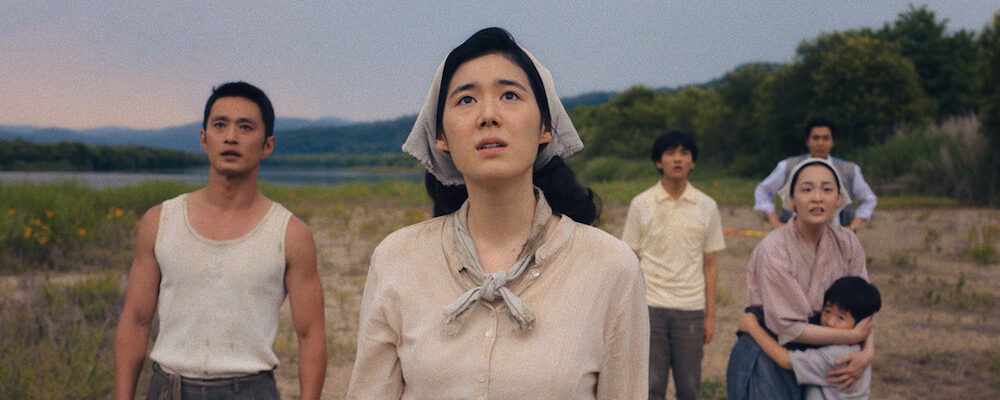‘Pachinko’ Season 2 Richly Expands Its Story of a Korean Family Across Generations
Alci Rengifo
The second season of Apple TV’s “Pachinko” is welcome proof that a good series adapted from IP can continue without losing its essence. Creator Soo Hugh’s adaptation of Min Jin Lee’s acclaimed novel premiered in 2022 as a work both sprawling and intimate. So many immigrant stories tend to strive for glowing inspiration or the high points about the greatness of the American dream. This one focuses on the real struggles of moving anywhere else, being an outsider and carrying generational trauma. Though this new selection of episodes spreads the story out more thinly, it still flawlessly connects to what came before.
The timelines switch between 1945 and 1989. Sunja (Minha Kim) and her family are trying to survive in Osaka’s Koreatown as World War II winds down and defeat feels imminent (despite the proclamations of the imperial government). Sunja’s husband, the Christian minister Isak (Steve Sang-Hyun Noh), has been thrown in prison for reciting the Lord’s Prayer instead of worshiping the emperor. Her former lover, Koh Hansu (Lee Minho), who is also the father of her son, Noa, has made the arrangements. But it’s a brutal existence where rations run low and bombers drop leaflets warning of impending raids. In 1989, Sunja’s grown grandson, Solomon (Jin Ha), is dealing with the hardships of his own failings as a businessman, while seeking revenge against Abe (Yoshio Maki). Even as Sunja and he still face the discrimination of being originally Korean, Solomon’s pride threatens to get in the way of overcoming obstacles and finding real progress.
Like the best shows of this type, getting back into “Pachinko” has a welcoming familiarity for viewers. We care enough about these characters to genuinely want to see them again. They remain a wonderful testament to how we are all at the mercy of historical and social forces. During the 1945 moments, Sunja balances rejecting Koh Hansu’s help (especially as her own husband remains in prison) and scrambling to have enough for making the kimchi that provides for the family. It’s harrowing to hear her speak about considering still using worm-ridden ration rice to feed her child. Sometimes characters become tragic participants in major events, as when the husband of Sunja’s sister-in-law has to leave to work at a munitions factory in Nagasaki. The ensuing nuclear bombing of the city by the U.S. is captured with a riveting, wrenching style using a ticking countdown on the soundtrack, along with a newsreel feel. In the 1990s, Solomon will face more ruin because of the 1990 Japanese financial crisis.
Even as the writing incorporates these events, “Pachinko” doesn’t let the historical highlights take over the narrative. The dramatic heft is in the personal relationships and crucibles. Soo Hugh and team swerve a bit more away from the novel, expanding on certain characters and situations. On television, this works very well. This is not a series desperate for overcooked twists in every episode. Emotional tension develops out of moments as when Sunja’s other son, Mozasu (Soji Arai), who is still working to grow his big pachinko business, offers financial help to the struggling Solomon. Sunja also undergoes new, important evolutions in the twilight of her life. She meets Kato (Jun Kunimura), a kind man in her age range, who quickly becomes a friend. The relationship develops into a courtship fraught with emotional danger, because as the story develops, it becomes clear there’s a potentially shady side to Kato. One can’t help but be touched by the drama, since Sunja has been through so much and is wise to the ways of the world, yet the heart can become so easily fragile. There are subtle contrasts with the episodes set in the ‘40s, where Koh becomes more involved in Sunja’s life and behaves like a possessive, jealous overlord. No doubt he senses Isak was the kind of decent man he will never be.
A running story through the season is his obsession with getting revenge for being let go at the massive corporation where he worked last season. Now adrift, he’s willing to go to extremes to get payback on Abe. You may recall he was let go for ruining a deal to buy land from a Korean grandmother. The incident awoke in Solomon sympathy for his roots, something which becomes clearer this season. In an early scene, Sunja is given the wrong cake at a store by a rude Japanese worker berating her accent. Such moments push Solomon to the edge. There might be hope in his subtle bond with former co-worker and rival Noami (Anna Sawai), though she suffers from being one of those characters who still tend to get lost in the shuffle. Season two is leaner yet still a massive canvas (like the novel). Barely enough space is given to Noa’s college years in the final episodes, hinting that season three will offer much more.
This second season of “Pachinko” features more haunting imagery than its predecessor. A truly cinematic series, it knows how to reach poetic heights. Isak’s expected death, after being ill for so long and then being imprisoned, is harrowing for the way his final moments with Sanju are filmed. There is a cremation scene following his passing worthy of an Ingmar Bergman movie. The writing makes it all more potent by not giving the audience easy answers or quick resolutions. Like the novel, it’s a series about the complexities of one’s roots and how they are bound to the unpredictability of life. The prejudices of an era, combined with its events, can impact an entire family on an intimate scale. Anyone planting a new home anywhere else, not out of luxury but survival, can relate to this story. “Pachinko” is special for being a unique portrait about a Korean family loaded with a universal resonance.
“Pachinko” season two begins streaming Aug. 23 with new episodes premiering Fridays on Apple TV+.

